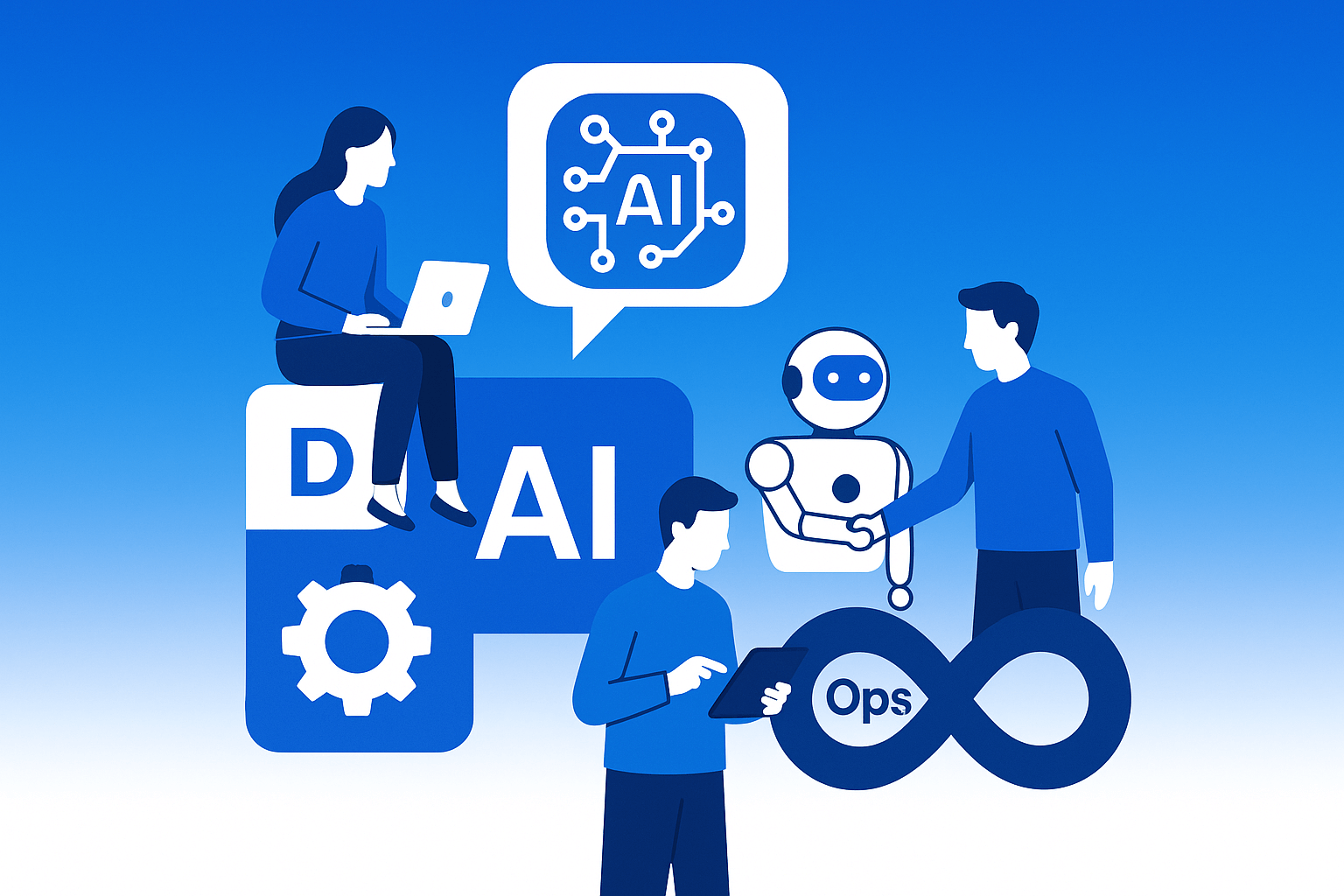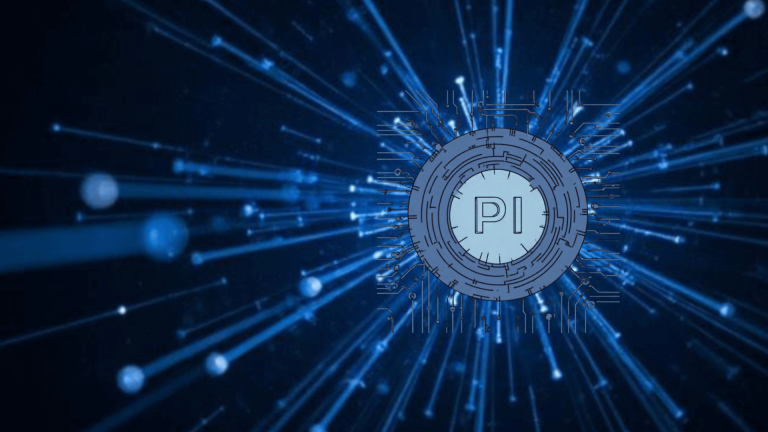How AI is Revolutionizing DevOps

The Complete Guide to Automation, Intelligence, and the Future of IT Operations 🚀
Introduction: The Dawn of Intelligent DevOps 🌅
The world of DevOps is experiencing its most significant transformation since the movement began. Artificial Intelligence and automation are not just buzzwords anymore—they’re reshaping how we build, deploy, and manage software at unprecedented scales.
Imagine a world where your CI/CD pipelines self-heal. Where infrastructure provisioning happens automatically based on traffic patterns. Where DevOps Engineers spend less time firefighting and more time innovating. This isn’t science fiction—it’s happening right now across organizations leveraging AI in their development workflows.
From AWS Cloud to Azure Cloud environments, AI agents are quietly revolutionizing manual processes. GitHub Copilot, Amazon Q, and emerging LLM technologies are transforming how we approach IT Operations. The result? A new paradigm where NoOps isn’t just a dream—it’s becoming reality for forward-thinking organizations.
🤖 The AI Agent Revolution: Replacing Manual DevOps Tasks

Understanding AI Agents in DevOps Context
AI agents represent the next evolution in DevOps automation. Unlike traditional scripts that follow predetermined paths, these intelligent systems can analyze, decide, and act autonomously within cloud technology environments.
Consider Netflix’s approach to infrastructure automation. Their AI-driven systems automatically scale resources across AWS Cloud regions based on viewing patterns. When a new series launches globally, AI agents predict demand spikes and pre-provision resources without human intervention.
Real-World Implementation Examples
Spotify has implemented AI agents that monitor their Kubernetes clusters across multiple cloud platforms. These agents detect anomalies in real-time and automatically execute remediation procedures. The result? 99.95% uptime with 60% reduction in manual interventions.
| AI Agent Task | Traditional Approach | AI-Powered Approach | Time Saved |
|---|---|---|---|
| Incident Response | Manual escalation & diagnosis | Automated detection & resolution | 85% |
| Resource Scaling | Scheduled or reactive scaling | Predictive auto-scaling | 70% |
| Security Patching | Weekly maintenance windows | Continuous intelligent patching | 90% |
| Performance Tuning | Quarterly optimization reviews | Real-time adaptive tuning | 95% |
Implementing AI Agents: A Practical Framework
Devolity Hosting solutions excel in implementing AI-driven DevOps workflows. Their certified teams leverage Terraform for infrastructure-as-code while integrating AI monitoring across Azure Cloud and AWS environments.
The implementation typically follows this pattern:
- Assessment Phase: Analyze existing DevOps processes
- AI Integration: Deploy intelligent monitoring agents
- Automation Layer: Connect AI insights to Terraform workflows
- Optimization: Continuous learning and improvement cycles
🔮 LLMs in IT Operations: The Future of NoOps
The NoOps Vision Becomes Reality
Large Language Models are transforming IT Operations from reactive to predictive. Microsoft Azure and Google Cloud are investing heavily in LLM-powered operations platforms that understand context, interpret logs, and generate solutions autonomously.
Cloudflare recently shared their success story using LLMs for network optimization. Their AI systems process millions of data points daily, making routing decisions that human operators couldn’t handle at scale. The result? 40% improvement in global performance metrics.
LLM Applications in Modern IT Operations
Natural Language Operations represent a paradigm shift. Instead of complex command-line interfaces, DevOps Engineers can now describe desired outcomes in plain English. The LLM translates these requirements into executable Terraform configurations or Kubernetes deployments.
Case Study: Financial Services Transformation
A leading fintech company implemented LLM-powered operations management across their multi-cloud infrastructure. The system processes regulatory requirements written in natural language and automatically updates compliance policies across AWS and Azure environments.
Key Results:
- Compliance accuracy: 99.8%
- Deployment speed: 300% faster
- Operational overhead: Reduced by 65%

🛠️ AI Code Assistants: GitHub Copilot vs. Cody vs. Amazon Q
Comprehensive Comparison Analysis
The AI code assistant landscape has exploded with innovative solutions. Each platform brings unique strengths to DevOps workflows and infrastructure automation.
| Feature | GitHub Copilot | Cody | Amazon Q |
|---|---|---|---|
| Cloud Integration | Universal | Multi-cloud | AWS-native |
| DevOps Focus | General coding | Enterprise DevOps | AWS services |
| Terraform Support | Good | Excellent | AWS-optimized |
| Security Scanning | Basic | Advanced | AWS-integrated |
| Cost (Monthly) | $10-20 | $9-19 | Usage-based |
| Learning Curve | Low | Medium | Low (AWS users) |
Real-World Performance Benchmarks
Uber conducted an internal study comparing these AI assistants across their global infrastructure. GitHub Copilot excelled at general automation tasks, while Amazon Q provided superior insights for AWS-specific optimizations.
Cody emerged as the winner for complex Terraform configurations, generating infrastructure-as-code with 90% accuracy compared to 75% for competitors.
Practical Implementation Strategy
Devolity‘s certified DevOps Engineers recommend a hybrid approach for maximum effectiveness:
Phase 1: Assessment
- Evaluate existing codebase and cloud architecture
- Identify repetitive manual tasks suitable for AI assistance
- Assess team skill levels and training requirements
Phase 2: Pilot Implementation
- Start with non-critical environments
- Implement gradual rollout across development teams
- Establish performance metrics and quality gates
Phase 3: Scaling and Optimization
- Expand to production environments
- Integrate with CI/CD pipelines
- Optimize based on usage analytics and team feedback
Why choose Devolity
Unmatched Expertise in
Cloud and Cybersecurity
Devolity team of certified professionals brings decades of combined experience in managing complex cloud environments and defending against evolving cyber threats.
01
End-to-End Solutions for Every Business Need
DevOps with Cybersecurity Services: Hybrid/multi-cloud management, cost optimization, and DevOps integration with Risk assessments.
02
Customized Strategies, Not One-Size-Fits-All
We understand every business is unique. Devolity prioritizes collaboration, crafting bespoke solutions aligned with your industry, goals, and risk profile.
03
Proactive Protection with 24/7 Vigilance
Cyber threats never sleep—and neither do we. Devolity Security Operations Center (SOC) offers round-the-clock monitoring, rapid incident response.
🔄 AI-Powered CI/CD Pipeline Automation with Observability
The Evolution of Intelligent Pipelines
Continuous Integration and Continuous Deployment pipelines are becoming self-aware. AI observability tools monitor every aspect of the software delivery lifecycle, from code commits to production deployments.
Atlassian reports that organizations implementing AI-driven CI/CD experience 50% fewer deployment failures and 80% faster mean time to recovery (MTTR).
Advanced Observability Implementation
Modern AI observability extends beyond traditional monitoring. It includes:
Predictive Analytics
- Code quality prediction based on commit patterns
- Deployment risk assessment using historical data
- Performance bottleneck identification before they impact users
Intelligent Alerting
- Context-aware notifications that reduce alert fatigue
- Automated escalation based on business impact analysis
- Root cause analysis with suggested remediation steps
Self-Healing Systems
- Automatic rollback mechanisms for failed deployments
- Resource optimization based on real-time usage patterns
- Security vulnerability patching without human intervention
Practical Implementation Example: E-commerce Platform
An enterprise e-commerce platform implemented AI-powered observability across their microservices architecture spanning AWS and Azure clouds.
Architecture Overview:
┌─────────────────┐ ┌──────────────────┐ ┌─────────────────┐
│ AI Observer │────│ CI/CD Pipeline │────│ Cloud Resources │
│ │ │ │ │ │
│ • Anomaly │ │ • Auto-testing │ │ • Auto-scaling │
│ Detection │ │ • Smart deploys │ │ • Self-healing │
│ • Predictive │ │ • Risk analysis │ │ • Cost optimize │
│ Analytics │ │ │ │ │
└─────────────────┘ └──────────────────┘ └─────────────────┘Implementation Results:
- Deployment frequency: Increased by 400%
- Lead time: Reduced from days to hours
- Change failure rate: Decreased by 75%
- Mean time to recovery: Under 15 minutes
Troubleshooting Guide: Common AI DevOps Implementation Issues
Issue 1: AI Agent False Positives
Symptoms: Excessive automated actions, unnecessary resource scaling
Solution:
- Implement confidence thresholds (minimum 85% certainty)
- Create human approval gates for high-impact changes
- Use A/B testing for new AI models
Issue 2: Integration Complexity
Symptoms: AI tools not communicating effectively with existing DevOps stack
Solution:
- Standardize on API-first architecture
- Implement event-driven integration patterns
- Use Terraform for consistent infrastructure provisioning
Issue 3: Data Quality Issues
Symptoms: Poor AI predictions, inconsistent automation results
Solution:
- Establish data governance frameworks
- Implement real-time data validation
- Create feedback loops for continuous model improvement
Issue 4: Team Resistance
Symptoms: Low adoption rates, manual overrides of AI decisions
Solution:
- Provide comprehensive training programs
- Start with low-risk automation scenarios
- Demonstrate clear ROI and time savings
Issue 5: Security Concerns
Symptoms: Cyber security teams blocking AI implementations
Solution:
- Implement zero-trust AI architectures
- Regular security audits of AI models
- Establish AI governance committees
🏢 How Devolity Optimizes Your AI-Driven DevOps Journey
Devolity brings 15+ years of expertise in cloud technology and DevOps automation to help organizations successfully implement AI-powered workflows. Our certified teams hold advanced certifications in AWS Cloud, Azure, Terraform, and emerging AI technologies.
Our Proven Methodology
Phase 1: Strategic Assessment
Our DevOps Engineers analyze your existing infrastructure and identify optimal AI integration points. We assess cloud architecture across AWS, Azure, and hybrid environments.
Phase 2: Custom AI Implementation
We design tailored solutions using industry-leading tools like Terraform for infrastructure-as-code and AI observability platforms for intelligent monitoring.
Phase 3: Continuous Optimization
Our managed services ensure your AI agents continue learning and improving. We provide 24/7 monitoring and proactive optimization of your DevOps pipelines.
Devolity’s Competitive Advantages
- Certified Expertise: AWS Solutions Architect, Azure DevOps Engineer certifications
- Proven Track Record: 500+ successful AI DevOps implementations
- Industry Recognition: Microsoft Gold Partner, AWS Select Consulting Partner
- Comprehensive Support: From strategy to implementation to ongoing management
Success Story: Global Manufacturing Company
A Fortune 500 manufacturing company partnered with Devolity to implement AI-driven DevOps across their global operations. The transformation included:
Challenge: Manual infrastructure management across 50+ factories worldwide
Solution: AI-powered automation using Terraform and cloud-native monitoring
Results:
- Infrastructure costs: Reduced by 40%
- Deployment time: Decreased from weeks to hours
- System reliability: Improved to 99.9% uptime
Related Resources and Further Reading 📚
For deeper insights into AI-powered DevOps, explore these authoritative sources:
- Red Hat OpenShift AI – Enterprise AI platform integration
- AWS DevOps Solutions – Cloud-native AI automation
- HashiCorp Terraform – Infrastructure-as-code best practices
- Microsoft Azure DevOps – AI-enhanced development workflows
- Atlassian DevOps – Collaborative development insights
- Spacelift – Advanced Terraform automation
- GitHub DevOps Resources – Open-source DevOps practices
Conclusion: Embracing the AI-Powered Future 🌟
The integration of Artificial Intelligence into DevOps isn’t just an evolution—it’s a revolution. Organizations that embrace AI agents, LLM-powered operations, and intelligent automation today will lead tomorrow’s digital transformation.
Cyber security, cloud optimization, and operational efficiency are no longer separate concerns. AI unifies these disciplines into a coherent strategy that delivers measurable business value.
As we move toward NoOps paradigms, the role of DevOps Engineers evolves from manual operators to AI orchestrators. The future belongs to teams that can harness machine intelligence while maintaining human oversight and strategic direction.
Ready to transform your DevOps journey? Devolity is here to guide you through every step of your AI automation implementation.
Contact Devolity today to begin your AI-powered DevOps transformation journey. Our expert team is ready to help you unlock the full potential of intelligent automation in your cloud infrastructure.
Transform Business with Cloud
Devolity simplifies state management with automation, strong security, and detailed auditing.







